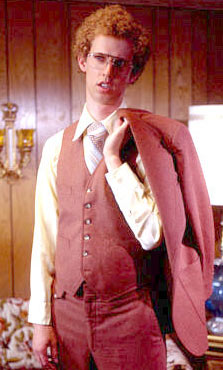 An underdog becomes an unlikely hero in this quirky comedy about finding out that being different can be cool, too! That ought to be the tagline for the movie “Napoleon Dynamite” ostensibly makes fun of . You assume director Justin Hess knew this. Writing a hip, original comedy would mean mocking a movie like that. Audiences are too sophisticated, too educated in pop irony to swallow that bromide. So, you assume, the heavy irony with which Hess seems to have draped his characters will not have a satisfying payoff. Napoleon will not get the girl, not enjoy a sudden spike in popularity after a geeky but heartfelt display, will not, simply by persevering in his adamantine idiosyncracies, achieve an explicit status-swap with his erstwhile tormentors. An underdog becomes an unlikely hero in this quirky comedy about finding out that being different can be cool, too! That ought to be the tagline for the movie “Napoleon Dynamite” ostensibly makes fun of . You assume director Justin Hess knew this. Writing a hip, original comedy would mean mocking a movie like that. Audiences are too sophisticated, too educated in pop irony to swallow that bromide. So, you assume, the heavy irony with which Hess seems to have draped his characters will not have a satisfying payoff. Napoleon will not get the girl, not enjoy a sudden spike in popularity after a geeky but heartfelt display, will not, simply by persevering in his adamantine idiosyncracies, achieve an explicit status-swap with his erstwhile tormentors.
Yet that’s exactly what happens. There is mockery without mockery here, and irony without irony, and satire without anything resembling bite: blank pastiche, as Jameson defined postmodernism. So baldly conceived is this tepid, miscalculated, and frankly dull movie that I sincerely wonder if, like any of Madonna’s howlers, this movie’s steadfast mediocrity isn’t a brilliant postmodern commentary on cinematic cliche and a director's ability to manipulate an audience into looking for what plainly isn't there.
It seems so off the mark I'm absolutely certain I missed the joke. Somehow, Hess has created a character as morose and unlikeable as Dawn Wiener in Todd Solondz’ “Welcome To The Dollhouse” and combined it with a plot—a meandering sub-”Rushmore”-like snooze of a plot—that’s as bright, well-intentioned, and crowd-friendly as “Lucas”. The result is neither fish nor fowl. The characters never live and breathe, becoming neither universal types to execute a satire nor uniquely individual people to cheer on. Each merely agglomerates a set of tics and grunts that does little beside distinguish him from the others. Just how badly did Hess want to have it both ways?
Even more weirdly, the story apparently takes place in present-day Idaho. Yet the look and sound of the film is awash in a stupefyingly complete nostalgia for the Eighties. In fact, without a few references to the Internet or a lip-sync dance to a Backstreet Boys number, the story could easily be set in 1982 or whenabouts (one of the characters, Uncle Rico, actually tries to use a time machine to get back to that year). Is Hess making a comment about the backwardness of folks in Idaho, that what a New York audience might take for ironic use of trash from the Me Decade is taken straight up by these cultural laggards? Or, if this is to remind us all of our childhoods, and how rad Alphaville was at our Senior Prom, why not just set the story in the Eighties?
Adding to the confusion, the ages of the actors seem all wrong. The cast members seem older than the teenagers they play. The age disparity isn’t of the negligible John Hughes variety. It conjures nothing so much as the blatant anachronisms of “Strangers With Candy” on TV. When a homemade time machine makes an appearance, it seemed at last a reasonable answer would come along. Perhaps, I hoped, “Napoleon Dynamite” would turn into a twisty sci-fi psychothriller like “Donnie Darko”. Alas, like everything else, it’s played straight. Napoloen tries the machine. It electrocutes him. He does not travel in time. Ba-dum-ching!
If this movie does make some small claim on one’s interest, it’s that “Napoleon Dynamite” could only have come along in a post-Wes Anderson world. Not that Hess steals from Anderson, unless you count incidentals like plot, mood, timing, and sensibility. Rather, this film heralds the true beginning of the post-Anderson age, in which funny-sad dramas about spontaneous communities of quirky fellow-travelers set to period music becomes what hit men quoting the Old Testament and gratuitous monologues about pop culture became for crime films in the post-Tarantino age. Expect more of the same as studio heads go for “that Wes Anderson feeling”. Hess and Jon Heder (who is, admittedly, note-perfect in his portrayal of dyspeptic Napoleon) may have a future in movies, but they should go back to the bread and butter of storytelling and leave the style to better heads. Lovable loser from Idaho learns to stand-up for himself and wins the heart of the girl he loves. Now that’s a movie I've seen a thousand times and wouldn’t mind seeing again. |